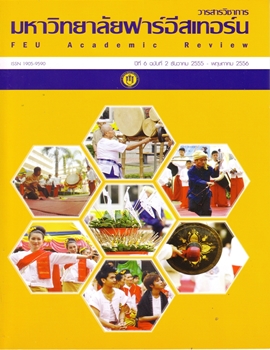แนวคิดการจัดการการท่องเที่ยวอย่างยั่งยืนกับตลาดสามชุก: ความสำเร็จและปัญหา
Main Article Content
Abstract
บทความนี้ได้กล่าวถึงความหมายและความสำคัญของตลาด และตลาดชุมชนที่ได้มีการปรับเปลี่ยนบทบาทไปสู่การเป็นแหล่งท่องเที่ยวทางวัฒนธรรม และมีการนำแนวคิดการบริหารจัดการการท่องเที่ยวอย่างยั่งยืนมาวิเคราะห์ตลาดสามชุกซึ่งเลือกมาเป็นตัวอย่างในการศึกษา เพื่อนำแนวคิดที่สังเคราะห์ได้มาเป็นกรอบคิดในการวิเคราะห์แผนการพัฒนาของตลาดสามชุก ผลการวิเคราะห์แสดงให้เห็นว่าแผนการพัฒนาของตลาดสามชุมมีความสอดคล้องกับแนวคิดในการบริหารจัดการการท่องเที่ยวอย่างยั่งยืนที่สังเคราะห์ได้ใน 4 ด้าน คือด้านการจัดการทรัพยากร ด้านการบริหารความสมดุลระหว่างมิติทางสังคม สิ่งแวดล้อมวัฒนธรรม และเศรษฐกิจ ด้านการสื่อสารข้อมูลการท่องเที่ยวและการรักษาความนิยมของสถานที่ท่องเที่ยว และด้านการมีส่วนร่วมหรือความร่วมมือจากท้องถิ่น ส่วนแนวทางการบริหารจัดการด้านการจัดการผลประโยชน์จากการท่องเที่ยวให้มีการกระจายไปยังทุกภาคส่วนของสังคมซึ่งไม่ปรากฏในแผนพัฒนาใดนั้นอาจจะประเด็นที่ทำให้ตลาดชุกเกิดปัญหาด้านการบริหารจัดการการท่องเที่ยวอย่างยั่งยืนในอนาคต
This article presents definition and an importance of market and community market that change role to cultural tourism market. Moreover, it includes principles of sustainable tourism management that is synthesized into the management concept. In order to use the synthesized management concept as the framework to analyze the development plan of Sam chuk Market. The analysis result reveals that the development plan of Samchuk Market harmonizes with the synthesized management concept into 4 dimension such as 1) resources management 2) social balance management, culture and economics 3) communication of tourism information and maintenance of popular tourist destinations and 4) local collaboration. However the inconsistence between the concept of tourism benefit management that disseminates to every part of society and the development plan of Samchok Market leads to the tourism management problem in the future.
Article Details
1. Any views and comments in the Journal of Social Innovation and Lifelong Learning are the authors’ views. The editorial staff have not to agree with those views and it is not considered as the editorial’s responsibility.
2. The responsibility of content and draft check of each article belongs to each author. In case, there is any lawsuit about copyright infringement. It is considered as the authors’ sole responsibility.
3. The article copyright belonging to the authors and The Far Eastern University are copyrighted legally. Republication must be received direct permission from the authors and The Far Eastern University in written form.

